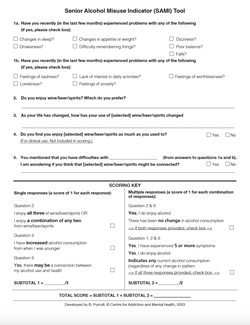Text adapted in 2022 from The Primary Care Addiction Toolkit (online only). A complete list of Toolkit authors, editors and contributors is available here.
Effects of alcohol on older adults
When adults aged 65 and older drink the same amount of alcohol as younger people, their blood alcohol levels are typically 30 to 40 per cent higher.
One reason for this difference is that older bodies tend to have less alcohol dehydrogenase available. This is the enzyme in the stomach that starts to break down alcohol before it reaches the bloodstream.
Older bodies also tend to have less water, which means that alcohol is less diluted in the blood of an older person. Women in general have less body water than men.
A higher blood alcohol level is associated with a higher risk of intoxication, cognitive difficulties and problems with balance and coordination.
Older adults' sensitivity to alcohol may also be heightened by medical conditions such as diabetes, hypertension or dementia or by medications.
Characteristics of harmful alcohol use in older adults
An alcohol use problem may begin earlier in life and continue into late life, or it may begin later in life in response to life events and the stresses of aging.
Long-term problems are referred to as early-onset problems and more recent problems as late-onset problems.
Older adults with early-onset problems are more likely to have:
- Poor physical health
- Small social networks
- Housing problems
- Financial problems or poverty
- Permanent or reversible brain damage leading to impaired judgment.
Older adults with late-onset problems tend to be more stable in all areas of their lives and may or may not show impaired judgment. Some older adults may temporarily increase their alcohol use following a loss or during periods of stress, but do not develop a late-onset problem.
Chronic physical pain is common in older adults and can lead to disability or functional impairment and emotional isolation. Older adults who experience chronic pain may self-medicate with alcohol or other drugs.
SAMI Screening Tool
The Senior Alcohol Misuse Indicator (SAMI) is a brief, senior-specific screening tool with questions that are designed to detect existing or potential alcohol problems in older adults without eliciting negative reactions, such as denial and defensiveness, from those being screened. View the introduction video to understand the usage of the tool.
Signs of alcohol problems in older adults
Focusing on how much alcohol an older person is consuming is not particularly helpful in determining if a problem exists. What is most important is examining how alcohol use affects the person's life.
The stigma that people with alcohol problems experience is even more severe in older adults, which may make some older patients reluctant to disclose how much alcohol they use and how it affects their lives. For this reason, be aware of the many red flags that suggest an alcohol problem.
These signs include:
- Falls, bruises, burns, fractures or other trauma, particularly if the person does not remember how or when the injury happened
- Minor traffic accidents (police do not typically suspect older adults of alcohol problems and may not subject them to a breathalyser or other sobriety test)
- Trouble sleeping, sleeping during the day
- Anxiety, confusion
- Drinking before going to a social event to "get started", rating social events and restaurants by the availability of alcohol
- Withdrawing from family, friends, neighbours and normal social practices
- Cigarette smoking
- Changes in personal grooming and hygiene
- Expulsion from housing
- Empty liquor, wine or beer bottles or cans in the garbage or concealed under the bed, in the closet or in other locations.
Screening older adults for unhealthy alcohol use: Strategies and tools
Screening question
Ask the patient:
"Have you consumed any alcohol within the past three months?"
If the answer is "yes," further screening may be needed.
Screening tool
The SMAST-G is a version of the Short Michigan Alcohol Screening Test modified for the geriatric population.
